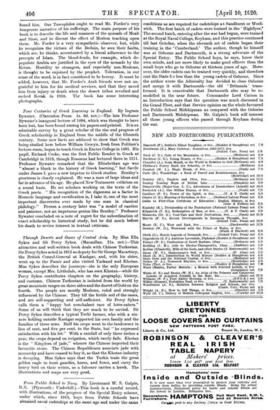Four Centuries of Greek Learning in England. By Ingram Bywater.
(Clarendon Press. Is. 6d. net.)—The late Professor Bywater's inaugural lecture of 1894, which was thought to have been lost, has been found among his papers and printed. It is an admirable survey by a great scholar of the rise and progress of Greek scholarship in England from the middle of the fifteenth century. Some new facts are adduced to show that Greek was being studied here before William Grocyn, fresh from Politian's lecture-room, began to teach Greek in Exeter College in 1491. His pupil, Richard Croke, was the first Public Reader in Greek at Cambridge in 1518, though Erasmus had lectured there in 1511. Professor Bywater remarked that the Elizabethan age was "almost a blank in the history of Greek learning," but Savile under James I. gave a new impetus to Greek studies. Bentley's greatness is clearly explained. He was a man of large ideas and far in advance of his age. He placed New Testament criticism on a sound basis. He set scholars working on the texts of the Greek poets. " His recognition of the digamma as a factor in Homeric language and versification is, I take it, one of the most important discoveries ever made by one man in classical philology." Person a century later was " a model of caution and patience, not an impetuous genius like Bentley." Professor Bywater concluded on a note of regret for the subordination of exact scholarship to historical study, but he did much before his death to revive interest in textual criticism.


































 Previous page
Previous page